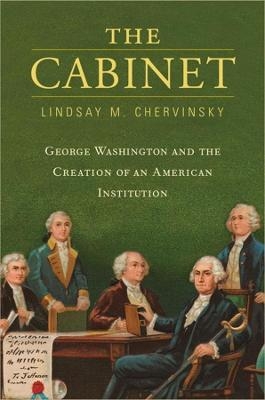
The Cabinet
George Washington and the Creation of an American Institution
Seiten
2022
Harvard University Press (Verlag)
978-0-674-27103-6 (ISBN)
Harvard University Press (Verlag)
978-0-674-27103-6 (ISBN)
The US Constitution says nothing about a presidential cabinet, yet this institution has grown powerful. Lindsay M. Chervinsky tells the story of George Washington’s cabinet, an ad hoc panel that responded to emergencies of the day. It is supposed to be the Senate’s job to advise the president, but the first cabinet changed that expectation forever.
Winner of the Daughters of the American Revolution’s Excellence in American History Book Award
Winner of the Thomas J. Wilson Memorial Prize
“Cogent, lucid, and concise…An indispensable guide to the creation of the cabinet…Groundbreaking…we can now have a much greater appreciation of this essential American institution, one of the major legacies of George Washington’s enlightened statecraft.”
—Ron Chernow
On November 26, 1791, George Washington convened his department secretaries—Alexander Hamilton, Thomas Jefferson, Henry Knox, and Edmund Randolph—for the first cabinet meeting. Why did he wait two and a half years into his presidency to call his cabinet? Because the US Constitution did not create or provide for such a body. Faced with diplomatic crises, domestic insurrection, and constitutional challenges—and finding congressional help distinctly lacking—he decided he needed a group of advisors he could turn to for guidance.
Authoritative and compulsively readable, The Cabinet reveals the far-reaching consequences of this decision. To Washington’s dismay, the tensions between Hamilton and Jefferson sharpened partisan divides, contributing to the development of the first party system. As he faced an increasingly recalcitrant Congress, he came to treat the cabinet as a private advisory body, greatly expanding the role of the executive branch and indelibly transforming the presidency.
“Important and illuminating…an original angle of vision on the foundations and development of something we all take for granted.”
—Jon Meacham
“Fantastic…A compelling story.”
—New Criterion
“Helps us understand pivotal moments in the 1790s and the creation of an independent, effective executive.”
—Wall Street Journal
Winner of the Daughters of the American Revolution’s Excellence in American History Book Award
Winner of the Thomas J. Wilson Memorial Prize
“Cogent, lucid, and concise…An indispensable guide to the creation of the cabinet…Groundbreaking…we can now have a much greater appreciation of this essential American institution, one of the major legacies of George Washington’s enlightened statecraft.”
—Ron Chernow
On November 26, 1791, George Washington convened his department secretaries—Alexander Hamilton, Thomas Jefferson, Henry Knox, and Edmund Randolph—for the first cabinet meeting. Why did he wait two and a half years into his presidency to call his cabinet? Because the US Constitution did not create or provide for such a body. Faced with diplomatic crises, domestic insurrection, and constitutional challenges—and finding congressional help distinctly lacking—he decided he needed a group of advisors he could turn to for guidance.
Authoritative and compulsively readable, The Cabinet reveals the far-reaching consequences of this decision. To Washington’s dismay, the tensions between Hamilton and Jefferson sharpened partisan divides, contributing to the development of the first party system. As he faced an increasingly recalcitrant Congress, he came to treat the cabinet as a private advisory body, greatly expanding the role of the executive branch and indelibly transforming the presidency.
“Important and illuminating…an original angle of vision on the foundations and development of something we all take for granted.”
—Jon Meacham
“Fantastic…A compelling story.”
—New Criterion
“Helps us understand pivotal moments in the 1790s and the creation of an independent, effective executive.”
—Wall Street Journal
Lindsay M. Chervinsky is a presidential historian and expert on US government institutions. She is a Senior Fellow at the Center for Presidential History at Southern Methodist University, and teaches on the American presidency at the School of Media and Public Affairs at George Washington University. She has contributed to the Washington Post, TIME, USA Today, The Hill, and CNN.com, among others, and has a regular column in Washington Monthly.
| Erscheinungsdatum | 21.02.2022 |
|---|---|
| Zusatzinfo | 3 Maps |
| Verlagsort | Cambridge, Mass |
| Sprache | englisch |
| Maße | 140 x 210 mm |
| Themenwelt | Geisteswissenschaften ► Geschichte ► Regional- / Ländergeschichte |
| Sozialwissenschaften ► Politik / Verwaltung ► Politische Systeme | |
| Sozialwissenschaften ► Politik / Verwaltung ► Politische Theorie | |
| Sozialwissenschaften ► Politik / Verwaltung ► Staat / Verwaltung | |
| ISBN-10 | 0-674-27103-3 / 0674271033 |
| ISBN-13 | 978-0-674-27103-6 / 9780674271036 |
| Zustand | Neuware |
| Informationen gemäß Produktsicherheitsverordnung (GPSR) | |
| Haben Sie eine Frage zum Produkt? |
Mehr entdecken
aus dem Bereich
aus dem Bereich
Erinnerungen
Buch | Softcover (2024)
Pantheon (Verlag)
CHF 22,40


